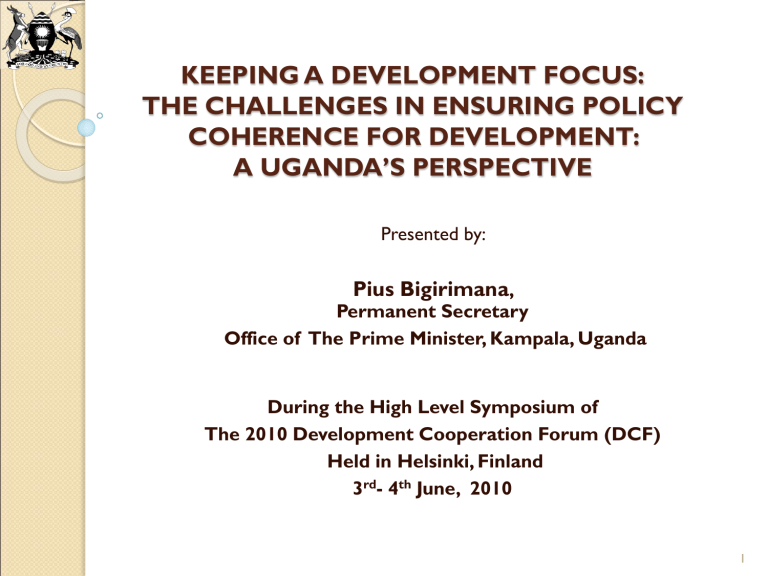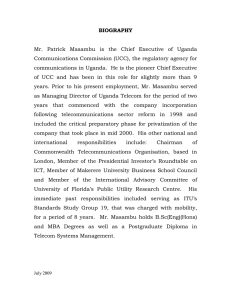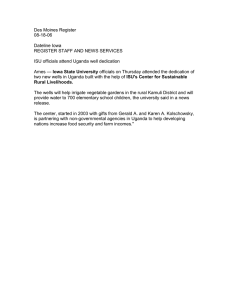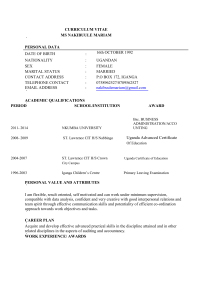Keeping a Development Focus: The Challenges in Ensuring Policy Coherence for Development: Uganda’s Perspective

KEEPING A DEVELOPMENT FOCUS:
THE CHALLENGES IN ENSURING POLICY
COHERENCE FOR DEVELOPMENT:
A UGANDA’S PERSPECTIVE
Presented by:
Pius Bigirimana ,
Permanent Secretary
Office of The Prime Minister, Kampala, Uganda
During the High Level Symposium of
The 2010 Development Cooperation Forum (DCF)
Held in Helsinki, Finland
3 rd - 4 th June, 2010
1
Outline of the Presentation
The role of Development Partners in ensuring Policy coherence for development
Experience in strengthening the policy coherence agenda
Experience in ensuring a coherent use of Aid and other development financing
The role of Development Partners in ensuring Policy coherence for development i) ii) iii) iv)
Reducing complexity and transaction costs in the delivery of Overseas Development
Assistance (ODA)
Increasing flexibility and predictability of aid levels
Respect for Country systems and
Structures
Ensuring more consistency and provision of longer-term commitments
3
Experience in strengthening the policy coherence agenda
There have been many challenges with donor coordination
( especially with alignment with Government systems and processes and of harmony between DPs)
A Joint Budget Support Framework (JBSF) and the Joint
Assessment Frame work (JAF) established
Considerations for joint financing mechanisms only (e.g. budget support, pooled funding, delegated cooperation etc.) or through multilateral agencies is underway
Capacity building in providing adequate leadership on development investing in human resources and institutions making greater use of country systems and increasing the predictability of aid flows.
4
i.
ii.
iii.
iv.
In Uganda in particular, measures to enhance better use of resources;
Strengthening local accountability mechanisms
Introduction of performance contracts
Strengthening Government Performance
Assessment including performance on JAF targets
Mutual Accountability with Development
Partners to be enhanced by developing accountability mechanisms
Development of a Partnership
Policy
Purpose is to guide partnerships between Uganda and its partners on aid and beyond aid issues.
Translates the commitments in the Paris Declaration
Principles and Accra Agenda for Action into actions
Policy development was participatory and included a critical analysis of the past, the approaches for managing partnerships, funding modalities and institutional arrangements for aid management and coordination.
Special focus on critical “Beyond Aid” issues with a discussion on how they influence or are influenced by the aid architecture. In the Uganda’s case, the most significant beyond aid issues are; Trade, Technology, Climate change,
Agriculture, Regional Integration, Debt relief and debt sustainability, Migration and Remittances and so on.
6
Experience in ensuring a coherent use of
Aid and other development financing
Started with PEAP Partnership Principles in 2003 considering the experience from 1997 when Uganda pursued the Poverty Eradication Strategy
Consistent with the Paris Declaration Principles on Aid
Effectiveness and the Accra Agenda for Action
Government’s national coordination mechanism and structures have been strengthened and redefined to involve
DPS and stakeholders
Considerations are underway on relating with DPs on
ODA
Efforts being developed on the principles to apply on mutual accountability in aid partnership agreements
7
End pf Presentation
8





